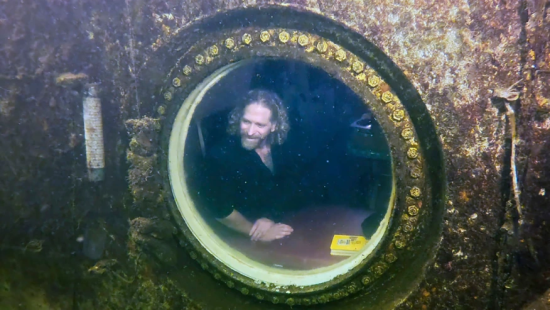
Dr. Joseph Dituri underwater at the Jules’ Undersea Lodge, May 13, 2023. Courtesy, Florida Keys News Bureau
In Key Largo, Florida, Dr. Joseph Dituri, a 55 year-old professor at the University of South Florida, has made history by breaking the world record for the longest time spent living in a fixed underwater habitat.
After spending an astounding 100 days submerged 22 feet below the surface at Jules’ Undersea Lodge, Dr. Dituri has resurfaced – reportedly knocking 10 years off his physical age. Upon undergoing a physical examination, medical professionals discovered that the telomeres in his DNA, which typically shorten with age, were 20% longer than before he embarked on his underwater journey. Furthermore, Dr. Dituri experienced a tenfold increase in stem cell count, offering potential for reversing visible aging.
Despite limited exercise options using bands for just an hour per day, Dr. Dituri successfully maintained his muscle mass living underwater, while his metabolism increased, resulting in a leaner physique. The transformative effects of his deep-sea hibernation truly demonstrated the impact of this unique hyperbaric experience.
“I’m humbled that my curiosity for discovery has led me here,” he said. “My goal is to inspire, not only for generations to come, but for scientists around the globe who study life undersea and how the human body functions when in extreme environments.”
Dr. Dituri’s 100 days underwater surpassed the world record of 72 days, previously held by Tennessee teachers Bruce Cantrell and Jessica Fain, who were at the same lab in 2014. While residing below the surface in a 100 square-foot pod, he continued his commitment to education, holding virtual lessons with more than 2,450 students. This dual pursuit of knowledge and adventure underscores his dedication to inspiring others and advancing our comprehension of life underwater.
Dr. Dituri’s groundbreaking research on the human body’s response to prolonged exposure to underwater pressure holds great promise, particularly in aiding individuals with traumatic brain injuries – his original inspiration to earn his doctoral degree from USF and begin hyperbaric research. His hypothesis: If hyperbaric pressure can be used to increase cerebral blood flow, then it can be used to treat traumatic brain injuries and a broad spectrum of diseases.
The implications of his work extend far beyond his personal achievements, as scientists worldwide eagerly anticipate the insights and discoveries that will emerge from his underwater odyssey.

